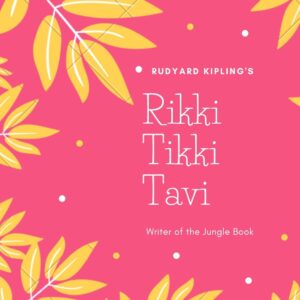
The world of children’s literature fascinates me and I many times find myself immersed into it. I read out to my kids, popular works of classic and contemporary Indian and American writers. Blessed with an audience of intent listening, it’s not just reading but lots of answering too, to their obvious and logical curiosities, which mark my fun time with my little listeners.
This week we decided to pick Rudyard Kipling’s Rikki-Tikki Tavi– the famed tale of a valiant mongoose who fights for his master with a deadly snake and his wife, Nagaina.
The story quickly got us hooked and was read out in a single sitting, without any break.
But my own curiosity of knowing behind-the-scene anecdotes and analysis of almost every story that I like, takes the course of some research. I found there were innumerable analytical essays and research submissions in renowned journals written on this enchanting story of Kipling.
Rudyard Kipling was known for his imperialist agenda, which also seeped into his stories and poems. Rikki-Tikki Tavi, if we note the symbolism behind it (which is hard to ignore), brings this agenda into the fore. The hero mongoose, on a second look is then reduced from a brave heart to a loyal colonial subject of imperialism and the narration thus implies the saving of an economically downtrodden India at the mercy of compassionate Britishers.
Take up the White Man’s burden–
Send forth the best ye breed–
Go, bind your sons to exile
To serve your captives’ need;
On fluttered folk and wild–
Your new-caught sullen peoples,
Half devil and half child.
– Kipling, “The White Man’s Burden”
Post-colonialism refers to the period when the colonizers leave the country of their rule and return to their homelands, leaving behind significant trails of their culture and influence in the colonies. The story is set in that era as a backdrop as it was written during that time. The white couple portrayed in the story represents the Britishers who proclaimed to help the ‘uncivilized’ or the ‘heathens’ (adherents of a religion that does not worship the God of Judaism, Christianity, or Islam.) by staying amongst them, apparently to help these underdeveloped countries deal with famine, provide medical aid and make them more ‘civilized.’ Kipling saw the British Empire as a means to establish the groundwork for civilization in countries like India, but not without lifting its image to the appellation of a culture superior to the rest.
Many consider him a victim of naivety and idealism because of his extreme opinion and the superior notion about his culture.
This story is without much evidence to support the attribution of evil to Nag and Nagaina, with the adjectives like ‘Black’ and ‘Wild’ describing their negative character. Their negativity in the story emerges on the grounds of law of the land which requires punishment to someone who kills. This reflects narrator’s subjective bias. Since the law of nature governs the snakes, the characters can’t really be considered negative. They can be considered threatening to the humans in the bungalow, but not idealistically villainous as the snakes considered humans threatening too for their eggs. Also, when we read more about Kipling, we can’t help but notice how the character description of Nag and Nagaina, resonate so much with the ideologies of his culture’s superiority.
Tacking advantage of the personal enmity between snake and mongoose and on account of the perks the Mongoose foresaw in being faithful to its masters, as instructed by its mother, he story makes the owners keep the mongoose as a guard against the snake and a playmate for their child, symbolic of the Indians whom the Britishers picked as their loyal subjects.
This revelation was heartbreaking. However, the innocent curiosity of children remains unaffected, to simply know what happens ahead in this enchanting tale of a valiant mongoose guarding a family, which saved it from drowning and dedicates its life to their safety and guard. And with Kipling’s magical skill of hooking his audience with his splendid supply of imagination, it would have been unfair to keep the children deprived of devouring his work.
